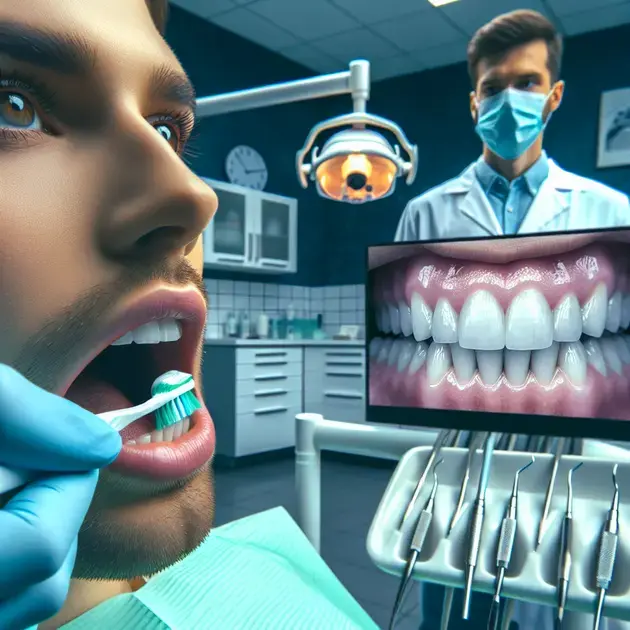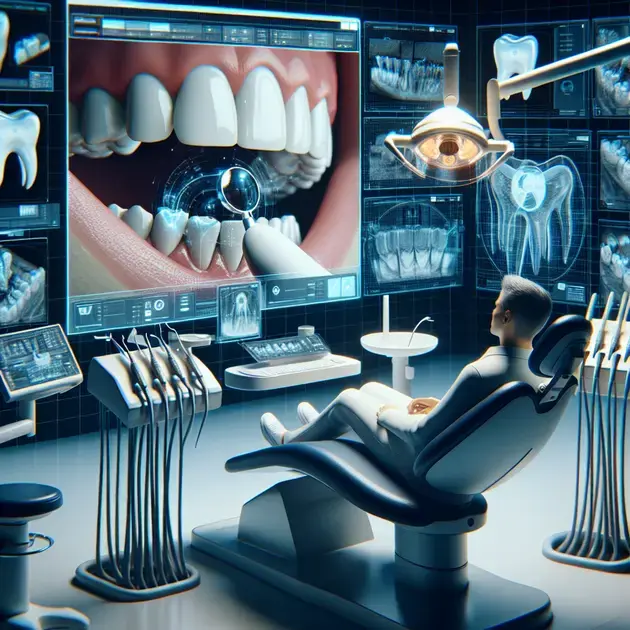Understanding cavities on teeth is essential for maintaining good oral health. Cavities, also known as dental caries, are a common dental issue that affects people of all ages. In fact, according to recent studies, 92% of adults between the ages of 20 and 64 have had cavities in their permanent teeth.
It’s important to understand the causes, symptoms, and treatment options for cavities to prevent further dental problems. This complete guide will provide you with all the information you need to know about cavities on teeth, including tips for prevention and how to effectively manage them.

Causes of Cavities on Teeth
Dental cavities, also known as caries, are caused by a combination of factors that result in the demineralization of the tooth enamel. The main causes of cavities on teeth include:
Poor Oral Hygiene:
Inadequate brushing and flossing can lead to the accumulation of plaque on the teeth. When plaque is not removed regularly, it can harden into tartar, which provides a breeding ground for bacteria that produce acids and cause cavities.
Sugar and Starch Consumption:
Frequent consumption of sugary and starchy foods and beverages can contribute to cavity formation. Bacteria in the mouth feed on these sugars and starches, producing acids that erode the enamel and lead to tooth decay.
Acidic Foods and Drinks:
Acidic foods and drinks, such as citrus fruits and soda, can weaken the enamel and make it more susceptible to cavities. The acid in these substances can erode the protective layer of the teeth, creating an environment conducive to tooth decay.
Dry Mouth:
Inadequate saliva production, often caused by certain medications or medical conditions, can increase the risk of cavities. Saliva helps neutralize acids in the mouth and wash away food particles, reducing the likelihood of decay.
Genetics:
Some individuals may be more predisposed to cavities due to genetic factors that influence the strength of their tooth enamel or the composition of their saliva. Family history can play a role in determining susceptibility to dental caries.
Common Symptoms of Dental Caries
Recognizing the symptoms of dental caries early on can help prevent further damage and complications. Some common signs of cavities include:
Tooth Sensitivity:
Pain or sensitivity in the teeth, especially when consuming hot, cold, or sweet foods and beverages, can indicate the presence of cavities. Sensitivity to pressure when biting or chewing is also a common symptom.
Toothache:
A persistent, throbbing toothache that does not subside on its own may be a sign of advanced tooth decay. The pain can range from mild to severe and may be localized to a specific tooth or area of the mouth.
Holes or Pits in the Teeth:
Visible holes, pits, or dark spots on the surface of the teeth are a clear indication of cavities. These structural changes in the enamel are caused by the erosion of tooth tissue due to bacterial activity.
Bad Breath:
Chronic bad breath, or halitosis, can be a symptom of cavities and tooth decay. The odor is typically caused by the release of gases from the bacteria that are breaking down food particles in the mouth.
Pus Around the Tooth:
In more severe cases of advanced cavities, abscesses may form at the root of the affected tooth, leading to the accumulation of pus. Swelling, redness, and tenderness in the gum tissue may also be present.
Effective Treatment Options for Cavities
When cavities are diagnosed, prompt treatment is essential to prevent further damage and preserve the affected tooth. Some effective treatment options for cavities include:
Dental Fillings:
The most common treatment for cavities involves removing the decayed portion of the tooth and filling the space with a dental filling material, such as composite resin or amalgam. This restores the tooth’s structure and function.
Dental Crowns:
If a cavity is extensive and has weakened the tooth significantly, a dental crown may be recommended to cover and protect the tooth. Crowns are custom-made to fit over the damaged tooth and restore its shape and strength.
Root Canal Therapy:
For advanced cavities that have reached the inner pulp of the tooth, root canal therapy may be necessary. This procedure involves removing the infected or damaged pulp, disinfecting the root canal, and sealing it with a filling to save the tooth.
Fluoride Treatment:
Fluoride treatments can help strengthen the enamel and prevent further decay in the early stages of cavity formation. Professional fluoride applications at the dentist’s office or prescription fluoride toothpaste can be beneficial.
Preventive Measures:
Maintaining good oral hygiene practices, such as regular brushing and flossing, limiting sugary foods and beverages, and attending routine dental check-ups, are crucial for preventing cavities and maintaining oral health.

Preventive Measures to Avoid Tooth Decay
When it comes to preventing tooth decay, there are several key measures that can help maintain good dental health. One of the most important preventive actions is to brush your teeth at least twice a day with fluoride toothpaste. This helps remove plaque build-up and reduces the risk of cavities. Additionally, flossing daily is crucial for removing plaque from between the teeth where toothbrushes can’t reach.
Another important preventive measure is to visit your dentist regularly for professional cleanings and check-ups. Your dentist can identify early signs of tooth decay and provide treatments to prevent further damage. They may also recommend dental sealants for added protection against cavities, especially for children.
Furthermore, maintaining a healthy diet low in sugary and acidic foods is essential for preventing tooth decay. Consuming foods high in calcium, such as dairy products, can help strengthen tooth enamel and reduce the risk of cavities. Drinking plenty of water and avoiding sugary beverages can also help protect your teeth.
Finally, using mouthwash with fluoride can provide an extra layer of protection against tooth decay. Rinse your mouth with mouthwash after brushing and flossing to help kill bacteria and strengthen your teeth.
The Role of Diet in Dental Health
Your diet plays a significant role in your dental health, affecting the strength of your teeth and the risk of tooth decay. Consuming a balanced diet rich in essential nutrients, such as calcium and vitamin D, is crucial for maintaining strong and healthy teeth. These nutrients help protect tooth enamel and prevent cavities.
Avoiding foods high in sugars and carbohydrates is also important for preventing tooth decay. Bacteria in the mouth feed on sugars, producing acids that can erode tooth enamel and lead to cavities. Limiting sugary snacks and drinks can help reduce the risk of dental problems.
Incorporating crunchy fruits and vegetables into your diet can also benefit your dental health. Foods like apples and carrots can help naturally clean your teeth and stimulate saliva production, which neutralizes acids in the mouth and remineralizes tooth enamel.
Along with a healthy diet, drinking plenty of water throughout the day can help wash away food particles and reduce the acidity in your mouth. Staying hydrated is essential for overall dental health and can contribute to preventing tooth decay.
Innovative Technologies for Detecting Cavities
Advancements in dental technology have introduced innovative methods for detecting cavities at early stages, allowing for prompt treatment and prevention of further decay. One such technology is digital radiography, which uses digital X-rays to detect cavities with higher accuracy and lower radiation exposure compared to traditional X-rays.
Laser fluorescence devices are another innovative tool for cavity detection, as they can identify early signs of tooth decay by measuring fluorescence levels in the teeth. This non-invasive method helps dentists detect cavities before they become visible on X-rays or to the naked eye.
Furthermore, diagnostic tools like intraoral cameras provide detailed images of the teeth and gums, allowing dentists to detect cavities in their early stages. These cameras can capture high-resolution images for better assessment and treatment planning, improving the chances of preventing tooth decay.
Caries detection solutions, such as transillumination devices, use light to detect cavities that may be hidden from traditional methods. By shining light through the teeth, dentists can identify areas of demineralization and early decay, leading to targeted treatment and prevention strategies.
Conclusion
In conclusion, maintaining good dental health and preventing tooth decay involves a combination of effective preventive measures, a balanced diet, and the utilization of innovative technologies. By brushing your teeth at least twice a day with fluoride toothpaste and flossing daily, you can reduce plaque build-up and decrease the risk of cavities. Regular visits to the dentist for cleanings and check-ups are crucial for early detection and treatment of tooth decay, with the potential recommendation of dental sealants for added protection.
Your diet plays a significant role in dental health, where consuming calcium-rich foods and avoiding sugary treats can help strengthen tooth enamel and prevent cavities. Incorporating crunchy fruits and vegetables into your diet, along with drinking plenty of water, can further promote oral health by naturally cleaning teeth and reducing mouth acidity. These dietary habits contribute to overall well-being and aid in the prevention of tooth decay.
Advancements in dental technology, such as digital radiography, laser fluorescence devices, and intraoral cameras, offer innovative methods for early cavity detection. These tools enable dentists to identify and treat tooth decay in its initial stages, leading to better outcomes and prevention strategies. By embracing a holistic approach that combines preventive actions, dietary choices, and cutting-edge technologies, individuals can safeguard their dental health and reduce the incidence of tooth decay effectively.